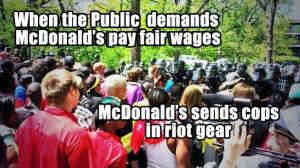A special NATIONAL HUNGER AWARENESS MONTH series |
|
|
|
 Last month, I joined Pittsburgh fast food workers and economic justice activists on a 3am bus headed to the McDonald’s annual shareholder meeting in Chicago. Fast food workers and community supporters from around the country traveled in to stand up for a living wage and the right to organize for fair treatment on the job.
Last month, I joined Pittsburgh fast food workers and economic justice activists on a 3am bus headed to the McDonald’s annual shareholder meeting in Chicago. Fast food workers and community supporters from around the country traveled in to stand up for a living wage and the right to organize for fair treatment on the job.
Workers led more than a thousand people on a march across the campus of Hamburger University, McDonald’s global corporate headquarters. “Moral Mondays” organizer Rev. Dr. William Barber II and Pittsburgh fast food worker Shawna Kelly were among the leaders who stood up for workers around the country.
We stood drenched in the hot sun while more than 100 workers and faith leaders were arrested as an act of peaceful civil disobedience:
The protests have also called attention to how the public pads fast food profits. Even without spending a nickle in a McDonald’s, anyone who pays taxes is subsidizing the company’s poverty wages. McDonald’s employees need over a billion dollars each year in public assistance money just to get by. Overall, low-wage workers cost the public a quarter-trillion dollars per year in anti-poverty spending that would not be necessary if these highly profitable companies committed to paying wages that would allow a full-time worker to stand on her own feet.
The next day, we woke before dawn and peacefully lined the streets as McDonald’s corporate board members drove in to start their meetings. We didn’t need faith or belief to maintain our vigil. We had hard numbers on our side fueling our fight:
- The restaurant industry, despite the 2008 recession, has enjoyed ever-increasing profit margins as well as an ever-growing pay gap between CEOs and the average fast food worker, making their sector the most unequal in the country.
- They spend millions lobbying to block even moderate increases in the minimum wage.
- To make matters worse, the bulk of new U.S. job creation in recent years has been in low-wage industries like fast food.
This means low-wage employers like McDonald’s and other fast food corporate giants now hold enormous power over what life looks like in our hometown neighborhoods. They create hunger every day by paying poverty wages and funding political strategies that keep wages low for all of us.
On the ride home, I thought about how hunger, poverty, and inequality result from decisions made by powerful people. We don’t elect the corporate executives and lobbyists of the fast food industry, but they wield great power over the health of our communities.
They make deals behind closed doors while we speak truth in the streets.
I came home inspired by the bold energy of fast food workers from around the country. I believe that we can win.
I’m grateful to One Pittsburgh for organizing Pittsburgh’s participation in this peaceful, powerful action standing up for everyone in this city. And I’m grateful for my role at Just Harvest, which will allow me to continue to push back against the people who keep us hungry.
Be a part of our efforts.
Sign our petition to raise the minimum wage.
A special NATIONAL HUNGER AWARENESS MONTH series |
|
|
|





No comments yet.